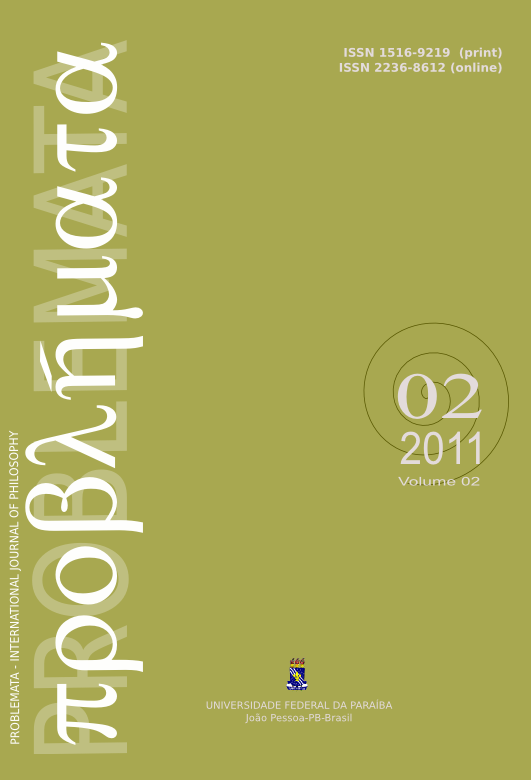THE BEGINNING OF THE CONCEPT OF DOGMATISM IN KANT<a href="http://dx.doi.org/10.7443/problemata.v2i2.10766"><i> <b>[doi: 10.7443/problemata.v2i2.10766]</b></i></a>
DOI:
https://doi.org/10.7443/problemata.v2i2.10766Keywords:
Dogmatismo, ceticismo, criticismo, lógica, matemáticaAbstract
The goal of this paper is to analyze the beginning of the concept of dogmatism attributed by Kant to the Enlightenment, particularly that one that begins with Leibniz. The idea is that we can find many elements, already presented in the pre-critical period, that make Kant an original thinker even before the appearance of the Critique of Pure Reason. Analyzing the comments made by Kant to Mendelssohn and Eberhard, it is revealed here a route of the kantian thought, that tries to follow closely the indications of the very Kant, in the sense that Kant himself mentions a shift not only in the history of pure reason, but also in his own thought, that is: there was a dogmatic period, another skeptical and finally the critical one. Based on this, it is possible to contest the current notion that there was this skeptical period in the kantian thought occasioned by the reading of Hume’s works.Downloads
Download data is not yet available.
Downloads
Published
2011-11-19
Issue
Section
Papers
License
Authors who publish with this journal agree to the following terms:
- Authors retain copyright and grant the journal right of first publication with the work simultaneously licensed under a Creative Commons Attribution License that allows others to share the work with an acknowledgement of the work's authorship and initial publication in this journal.
- Authors are able to enter into separate, additional contractual arrangements for the non-exclusive distribution of the journal's published version of the work (e.g., post it to an institutional repository or publish it in a book), with an acknowledgement of its initial publication in this journal.
-
- Authors are permitted and encouraged to post their work online (e.g., in institutional repositories or on their website) prior to and during the submission process, as it can lead to productive exchanges, as well as earlier and greater citation of published work (See The Effect of Open Access).





